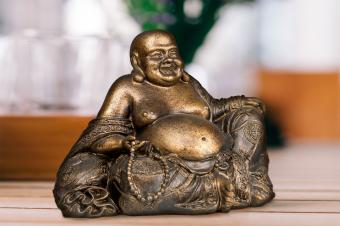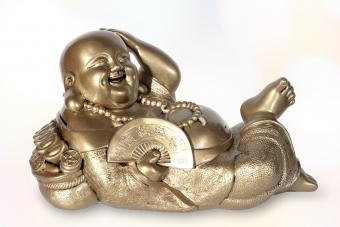
It's difficult not to smile when you gaze upon the jolly image and countenance of a Laughing Buddha statue. The merry grin, rotund belly, and air of exuberance of the monk known as Hotei evoke joy and attract good fortune and luck when carefully placed. There are many types of Laughing Buddha statues, and you may be wondering what does a Laughing Buddha mean? Below are the meanings and symbolism of each type with some helpful tips to incorporate this cheerful figurine into your feng shui décor.
Laughing Buddha Statue Meaning
The jubilant pot-bellied Laughing Buddha (sometimes called Happy Buddha or Smiling Buddha) has a distinctly different appearance from the lean and tranquil Gautama Buddha, whose teachings are the basis for Buddhism. It's believed that Laughing Buddha is a well-known Chinese monk from the Liang Dynasty (502-557 CE) who was on the path to Buddhahood. In Japanese Buddhism, Hotei is one of the Seven Gods of Good Luck called Shichi-fuku-jin. Happy Buddha statues bring luck and joy in feng shui design when you place him in your home, office, or vehicle, and many people believe it brings additional good luck to rub the round Laughing Buddha belly.
Types of Laughing Buddha Statues
How many types of Laughing Buddha statues are there? Laughing Buddha statues come in many poses that also include various symbols for specific luck and fortune. With all the different Laughing Buddha statue meanings and poses available, you can select the right statue to use in any sector where you need more luck. Use the placement chart below to help you place specific lucky Buddha statues.

Pearls of Wisdom

The Laughing Buddha is often depicted wearing a string of pearls of wisdom. Some of these statutes also include him holding a ball or pearls, known as a wealth ball. There are several variations of this symbolic statue. Some include a standing or sitting Laughing Buddha holding a ball or pearl in each of his uplifted hands, a reclining pose with strings of pearls around his neck and one in his hand, or many others. Place this statue in locations that cultivate wealth, such as in your home office or the career or wealth sector of your home.
Money Frog

Sometimes your Laughing Buddha statue needs a ride, and when he rolls up riding a money frog, it compounds the good luck. If you place this Lucky Buddha statue correctly, you can enhance career luck, as well as invite happiness, wealth, and blessings. Therefore, this symbol is especially powerful when placed in either a corporate or home office or in the wealth sector of your home.
Laughing Buddha Money Bags Traveling

Money bags traveling Laughing Buddha depicts the monk with a large money bag slung over his back and holding a Wu Lou (gourd) that is a symbol of good health, healing, and longevity. The traveling Buddha is a very popular symbol used in feng shui applications, especially for afflicted areas that need a little boost in luck. For good health luck and longevity, place it in the health sector. For family luck, place it in the family sector. For luck during travel, place it in the travel sector.
Standing

The standing pose Buddha is nicknamed "Happy" since he is laughing with his hands lifted above his head as though in celebration. This pose is also called Jolly Hotei. The statue often features a gold ingot or a ball held above its head or one in each open palm. Jolly Hotei brings wealth, and of course, happiness. Place this statue in the wealth or career sectors.
Laughing Buddha With Children

A Laughing Buddha with children, specifically five children, represents a large healthy and happy family. Feng shui applications use this statue pose to attract good luck and blessings to a home and especially luck for the children in the family. It's also a symbol of creativity and the abundance of a full and happy life. Place in the children's sector to attract creativity and good luck for your children.
Laughing Buddha With Fan in Hand

The Laughing Buddha with a fan in hand is often used for auspicious travel and those who want a wish granted. The bag once more is a symbol of money, or it can symbolize collecting woes and cares to carry away from the person. The fan is an ancient symbol known as the Oogi that translates to wish giving or granting, and this statute is used as a wish granting symbol. You can place it in any sector where you want to have a wish granted.
General Placements for Smiling Buddha Statues
Any Laughing Buddha statue can bring luck. Place a Laughing Buddha statue in the following places for specific types of luck:
| If you desire... | Put your statue in... |
| A windfall of money | Foyer, bedroom, or dining room |
| A boost to your income | Entryway |
| Work harmony | Office |
| Safe travels | Vehicle dashboard |
| Education luck | Student desk |
Don't place Laughing Buddha on the floor, or in a kitchen or bathroom.
Hotei Statue Materials and Placement
The materials used to make your Smiling Buddha statue can also direct placement. The materials activate feng shui elements and bring positive vibes to various sectors of your home.
| Material | Sector Placement |
| Wood |
|
| Gemstones or stone (such as jade) |
|
| Metallic (gold, silver, pewter, copper, etc.) |
|
Happy Buddha Colors and Placement
Some Laughing Buddha statues are made from resin or other materials that don't fit within the feng shui elements, but the color it is dyed or painted represents various feng shui elements and can help you determine placement.
| Color | Sector Placement |
| Red, purple |
|
| Yellow, orange, brown |
|
| Gold, silver, copper, white, light gray |
|
| Dark blue, black, dark gray |
|
| Green, light blue, teal |
|
Laughing Buddha and Feng Shui
Let Laughing Buddha's perpetual smile and good cheer enhance the energy in your life. This symbol of good fortune will not only make you grin every time you see him, but placing his statue in your personal spaces can attract positive energy and promote good feng shui.







